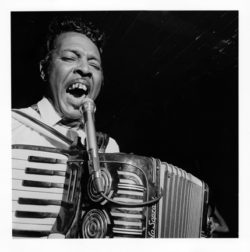Clifton Chenier
Clifton Chenier, self-proclaimed “King of the Bayou,” pioneered the modern sound of zydeco music starting in the 1950s.

The Historic New Orleans Collection
Charles Traub shot this photograph of Clifton Chenier, singing into a microphone and playing the accordion, in 1974.
Starting in the 1950s, Clifton Chenier pioneered the modern sound of zydeco and eventually became one of the genre’s best-known performers. The self-proclaimed “King of Zydeco” won a Grammy for his 1983 album I’m Here, was awarded a National Heritage Fellowship, and played at the White House for President Ronald Reagan.
Born June 25, 1925, near Opelousas, Chenier learned to play the accordion from his father Joseph, who worked as a sharecropper. Chenier came from an extended family of musicians who played in the older Creole “la la” style, which was closely related in sound to early Cajun music. He was influenced by the recordings and live performances of the celebrated Creole accordionist Amédé Ardoin and the almost forgotten Sidney Babineaux, who was one of the earliest Creoles to play the larger piano accordion, which Chenier made famous. Scholars have debated whether Chenier ever publicly played the smaller diatonic accordion associated with Cajun music, but evidence seems to suggest that he at least learned to play that instrument from his father. During the 1940s, Chenier absorbed the “jump blues” style of Louis Jordan and was soon fusing rhythm and blues (R&B) with Creole music. Out of this potent mixture came modern zydeco.
Chenier and his brother Cleveland started playing dances in the 1940s in Louisiana and, by the early 1950s were operating along the Texas border. After losing a job at an oil refinery in Beaumont, Texas, Chenier entered the music profession full time. He designed the vest-style frottoir, based on the washboard that his brother used to provide a rhythmic accompaniment to the accordion, thus giving birth to the basic percussive sound identified with zydeco. The Cheniers worked on the “chitlin circuit,” a loose network of juke joints and dance halls in the southern United States that catered to an African American clientele. On the circuit he met fellow Louisianan Clarence “Bon Ton” Garlow, an R&B guitarist, club owner, and disc jockey in Beaumont. Garlow linked Chenier to the California producer J. R. Fulbright, who signed the zydeco performer to a recording contract. Chenier made his first recordings in Lake Charles in 1954. In 1955 Chenier released his first major hit, “Ay Tete Fee,” on the Speciality label. With this recording, Chenier emerged onto the national R&B scene and shared the stage with major headliners such as Joe Turner. Chenier further refined his music by adding trumpets and saxophones to his lineup of accordion, frottoir, drums, and guitars. Chenier’s music was highly danceable, hard driving, and propulsive in nature, as demonstrated by his cover of Jordan’s “Let the Good Times Roll” (written by Louisianan Sam Theard). He also demonstrated a great ability with blues material, including songs like “I’m a Hog for You,” which became major parts of his repertoire.
Like that of many artists, Chenier’s career waned in the wake of rock ‘n’ roll. He returned to Louisiana and recorded for the Crowley label Zynn during the late 1950s, but his career seemed to stall. Then blues musician Lightnin’ Hopkins (a relative by marriage) introduced Chenier to Chris Strachwitz, the owner of Arhoolie Records. Strachwitz signed Chenier to a recording contract and gave the accordion master nearly free rein in the studio. In 1964 Arhoolie released its first Chenier single, “Ay Ai Ai.” The record enjoyed great popularity and restarted Chenier’s career. He toured widely throughout the United States and Europe from the mid-1960s until his death. He regularly drew large crowds at the Montreaux Jazz Festival and the New Orleans Jazz & Heritage Festival. While he recorded with many labels, including Jin and Maison de Soul, his best recordings were with Arhoolie. During this time he proclaimed himself the “King of Zydeco” and took to the stage wearing either a crown or diadem.
Chenier suffered numerous health problems in his later years. Diabetes plagued him and he lost part of a foot, but he still took to the stage as often as possible. He died December 13, 1987, in Lafayette. Chenier left a powerful legacy in Louisiana music, transforming the old rural “la la” sound into a modern R&B style that garnered acceptance around the world. He was also an emotional singer and a deeply beautiful accordionist whose performances crossed genre lines.
